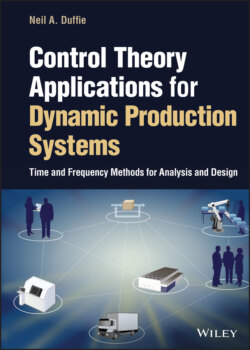Читать книгу Control Theory Applications for Dynamic Production Systems - Neil A. Duffie - Страница 29
Example 2.8 Discrete-Time Model of Assignment of Production Workers with Delay
ОглавлениеThe rate of orders input to a production system often fluctuates and it is necessary to adjust production capacity to follow this order input rate. The use of a discrete-time exponential filter in decision-making to smooth fluctuations was described in Example 2.6 and as shown in Figure 2.13, an exponential filter is used in a similar manner in this example to determine the portion of the production capacity to be provided by permanent workers; this portion cannot be adjusted quickly and should not be adjusted at high frequencies. The remaining portion is provided by cross-trained workers; this portion can be adjusted immediately.
Figure 2.13 Adjustment of permanent and cross-trained worker capacity in a production system to match fluctuating order input rate.
Order input rate ri(kT) orders/day is measured regularly with a period of T days, weekly for example, and the portion of production capacity provided by permanent workers rp(kT) orders/day is adjusted; however, because of logistical issues in hiring and training, there is a delay of dT days in implementing permanent worker adjustment decisions where d is a positive integer. The exponential filter is used to focus adjustments in permanent worker capacity on relatively low frequencies:
where 0 < α ≤ 1. A relatively high value of weighting parameter α results models relatively rapid adjustment of permanent worker capacity, whereas a relatively low value of weighting parameter α models significant smoothing and relatively slow adjustment of permanent worker capacity.
The portion of production capacity provided by permanent workers is
where dT days is the delay in implementing permanent worker capacity adjustments. Hence, the portions of fluctuating order input that are addressed by permanent worker capacity rp(kT) orders/day and cross-trained capacity rc(kT) orders/day are
